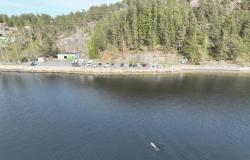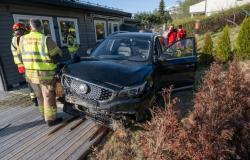This week, Øvelse Nord is being held in Bodø, as a very important joint training arena. Today, more than ever before, it is important that we prepare for the worst.
Exercise Nord is a full-scale preparedness exercise where various actors train on handling major incidents and crises. The exercise is the Nordic region’s largest civilian mainland exercise, and the largest of its kind in Europe under the auspices of a university.
Nord University organizes the exercise, in which, among other things, the main rescue centre, the police, the fire service, municipalities, the county council, emergency services, hospitals, the Swedish Home Guard, voluntary organizations and the Coast Guard cooperate. I have had the pleasure of representing Telenor on the program during the professional days that start the exercise, and have had a number of interesting conversations and again seen how important it is that we exercise together across sectors.
In the context of defense and preparedness, Northern Norway is very important. For Telenor, as an important player in Norway’s total defence, the country is also very important to us. This is one of the reasons why over the years we have invested heavily in the development of 4G and 5G here as well.
The relationship with our neighbor to the north is more uncertain than it has been for a long time. This presents Telenor and other owners of critical infrastructure with an increasingly complex threat and risk picture. The e-service has pointed out that we must now be prepared for scenarios that were previously unthinkable.
Telenor’s network and services are crucial for society-critical functions such as water and electricity supply, emergency services, finance and health to function. Longer downtime in critical infrastructure will ultimately paralyze society.
Practice more across sectors Today’s digital society means that many businesses are dependent on each other to function. This is both a strength and a weakness. The advantage is that we are efficient and can create value more quickly. The downside is that we are far more vulnerable. Mutual dependencies make it more difficult to have control over security at all stages. For example, threat actors can bypass suppliers with weaker security routines in order to reach and target socially critical businesses. We in Norway are no safer than our weakest link.
Therefore, we must practice more on real scenarios that reflect the threat picture, and we must practice across sectors. Only in this way will we achieve a better understanding of how we depend on each other and gain insight into the possible ripple effects and extent of actual crises. In this way, we will also learn more about how we must coordinate information sharing and efforts, as well as interact during real incidents. Here we still have improvement potential. As the National Audit Office has pointed out: “There is a need for more practice in cross-sector handling of incidents at national level”.
Business must be an integral part of the total defense Telenor has for several years organized exercise Buck Leap in collaboration with the Cyber Defense. Last year, the National Security Agency was also a partner. The exercise brings together participants from the civil, military and public sectors as well as private business.
We see a need for a few more prioritized national exercises such as Øvelse Nord and Vaulting that involve across sectors. We therefore want the authorities to facilitate better interaction and planning of exercises that also involve business.
A large part of Norway’s socially critical infrastructure and functions are owned and supplied by business actors. Precisely for this reason, it is absolutely crucial that business is a clearly integrated part of the total defense of Norway with good access to threat and security information. It is also clear that we need better solutions for interaction that include low-level information.
Interdependencies make us vulnerable Telenor deals with various types of threat actors on a daily basis. Safety and preparedness are integrated in all our processes. We regularly practice what can happen to us, and we will continue to do so. But the experience businesses gain from their own internal exercises will have limited value if we do not know how to interact and coordinate with others when crises strike us or our partners.
We live in an age of international destiny. Foreign states are interested in Norwegian politics, technology and the oil and gas industry. Increased geopolitical tension presents owners of critical infrastructure with an increasingly complex threat and risk picture. Safety is therefore something we must work on all the time, and we must help each other to improve. We have to practice scenarios that today may appear unthinkable. We must have a common understanding of threats, and we must understand how the civil, military and public sector as well as private business are dependent on each other. Our digital resilience is a joint national responsibility.






